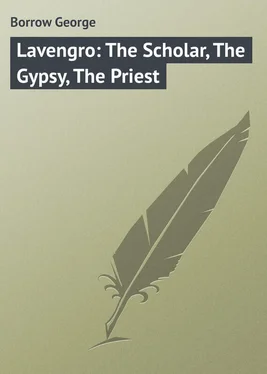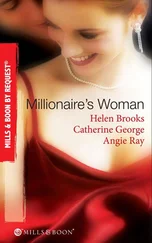George Borrow - Lavengro - The Scholar, The Gypsy, The Priest
Здесь есть возможность читать онлайн «George Borrow - Lavengro - The Scholar, The Gypsy, The Priest» — ознакомительный отрывок электронной книги совершенно бесплатно, а после прочтения отрывка купить полную версию. В некоторых случаях можно слушать аудио, скачать через торрент в формате fb2 и присутствует краткое содержание. Жанр: foreign_prose, на английском языке. Описание произведения, (предисловие) а так же отзывы посетителей доступны на портале библиотеки ЛибКат.
- Название:Lavengro: The Scholar, The Gypsy, The Priest
- Автор:
- Жанр:
- Год:неизвестен
- ISBN:нет данных
- Рейтинг книги:5 / 5. Голосов: 1
-
Избранное:Добавить в избранное
- Отзывы:
-
Ваша оценка:
- 100
- 1
- 2
- 3
- 4
- 5
Lavengro: The Scholar, The Gypsy, The Priest: краткое содержание, описание и аннотация
Предлагаем к чтению аннотацию, описание, краткое содержание или предисловие (зависит от того, что написал сам автор книги «Lavengro: The Scholar, The Gypsy, The Priest»). Если вы не нашли необходимую информацию о книге — напишите в комментариях, мы постараемся отыскать её.
Lavengro: The Scholar, The Gypsy, The Priest — читать онлайн ознакомительный отрывок
Ниже представлен текст книги, разбитый по страницам. Система сохранения места последней прочитанной страницы, позволяет с удобством читать онлайн бесплатно книгу «Lavengro: The Scholar, The Gypsy, The Priest», без необходимости каждый раз заново искать на чём Вы остановились. Поставьте закладку, и сможете в любой момент перейти на страницу, на которой закончили чтение.
Интервал:
Закладка:
It was for want of something better to do that, shortly after my return home, I applied myself to the study of languages. By the acquisition of Irish, with the first elements of which I had become acquainted under the tuition of Murtagh, I had contracted a certain zest and inclination for the pursuit. Yet it is probable that had I been launched about this time into some agreeable career, that of arms for example, for which, being the son of a soldier, I had, as was natural, a sort of penchant, I might have thought nothing more of the acquisition of tongues of any kind; but, having nothing to do, I followed the only course suited to my genius which appeared open to me.
So it came to pass that one day, whilst wandering listlessly about the streets of the old town, I came to a small book-stall, and stopping, commenced turning over the books; I took up at least a dozen, and almost instantly flung them down. What were they to me? At last, coming to a thick volume, I opened it, and after inspecting its contents for a few minutes, I paid for it what was demanded, and forthwith carried it home.
It was a tessaraglot grammar; a strange old book, printed somewhere in Holland, which pretended to be an easy guide to the acquirement of the French, Italian, Low Dutch, and English tongues, by means of which anyone conversant in any one of these languages could make himself master of the other three. I turned my attention to the French and Italian. The old book was not of much value; I derived some benefit from it, however, and, conning it intensely, at the end of a few weeks obtained some insight into the structure of these two languages. At length I had learnt all that the book was capable of informing me, yet was still far from the goal to which it had promised to conduct me. ‘I wish I had a master!’ I exclaimed; and the master was at hand. In an old court of the old town lived a certain elderly personage, perhaps sixty, or thereabouts; he was rather tall, and something of a robust make, with a countenance in which bluffness was singularly blended with vivacity and grimace; and with a complexion which would have been ruddy, but for a yellow hue which rather predominated. His dress consisted of a snuff-coloured coat and drab pantaloons, the former evidently seldom subjected to the annoyance of a brush, and the latter exhibiting here and there spots of something which, if not grease, bore a strong resemblance to it; add to these articles an immense frill, seldom of the purest white, but invariably of the finest French cambric, and you have some idea of his dress. He had rather a remarkable stoop, but his step was rapid and vigorous, and as he hurried along the streets, he would glance to the right and left with a pair of big eyes like plums, and on recognising any one would exalt a pair of grizzled eyebrows, and slightly kiss a tawny and ungloved hand. At certain hours of the day he might be seen entering the doors of female boarding-schools, generally with a book in his hand, and perhaps another just peering from the orifice of a capacious back pocket; and at a certain season of the year he might be seen, dressed in white, before the altar of a certain small popish chapel, chanting from the breviary in very intelligible Latin, or perhaps reading from the desk in utterly unintelligible English. Such was my preceptor in the French and Italian tongues. ‘Exul sacerdos; vone banished priest. I came into England twenty-five year ago, “my dear.”’
CHAPTER FIFTEEN
MONSIEUR DANTE – CONDEMNED MUSKET – SPORTING – SWEET RIVULET – THE EARL’S HOME – THE POOL – THE SONOROUS VOICE – WHAT DOST THOU READ? – THE MAN OF PEACE – OF ZOHAR AND MISHNA – THE MONEY-CHANGERS
So I studied French and Italian under the tuition of the banished priest, to whose house I went regularly every evening to receive instruction. I made considerable progress in the acquisition of the two languages. I found the French by far the most difficult, chiefly on account of the accent, which my master himself possessed in no great purity, being a Norman by birth. The Italian was my favourite.
‘Vous serez un jour un grand philologue, mon cher,’ said the old man, on our arriving at the conclusion of Dante’s Hell.
‘I hope I shall be something better,’ said I, ‘before I die, or I shall have lived to little purpose.’
‘That’s true, my dear! philologist – one small poor dog. What would you wish to be?’
‘Many things sooner than that; for example, I would rather be like him who wrote this book.’
‘Quoi, Monsieur Dante? He was a vagabond, my dear, forced to fly from his country. No, my dear, if you would be like one poet, be like Monsieur Boileau; he is the poet.’
‘I don’t think so.’
‘How, not think so? He wrote very respectable verses; lived and died much respected by everybody. T’other, one bad dog, forced to fly from his country – died with not enough to pay his undertaker.’
‘Were you not forced to flee from your country?’
‘That very true; but there is much difference between me and this Dante. He fled from country because he had one bad tongue which he shook at his betters. I fly because benefice gone, and head going; not on account of the badness of my tongue.’
‘Well,’ said I, ‘you can return now; the Bourbons are restored.’
‘I find myself very well here; not bad country. Il est vrai que la France sera toujours la France; but all are dead there who knew me. I find myself very well here. Preach in popish chapel, teach schismatic, that is Protestant, child tongues and literature. I find myself very well; and why? Because I know how to govern my tongue; never call people hard names. Ma foi, il y a beaucoup de différence entre moi et ce sacre de Dante.’
Under this old man, who was well versed in the southern languages, besides studying French and Italian, I acquired some knowledge of Spanish. But I did not devote my time entirely to philology; I had other pursuits. I had not forgotten the roving life I had led in former days, nor its delights; neither was I formed by Nature to be a pallid indoor student. No, no! I was fond of other and, I say it boldly, better things than study. I had an attachment to the angle, ay, and to the gun likewise. In our house was a condemned musket, bearing somewhere on its lock, in rather antique characters, ‘Tower, 1746’; with this weapon I had already, in Ireland, performed some execution among the rooks and choughs, and it was now again destined to be a source of solace and amusement to me, in the winter season, especially on occasions of severe frost when birds abounded. Sallying forth with it at these times, far into the country, I seldom returned at night without a string of bullfinches, blackbirds, and linnets hanging in triumph round my neck. When I reflect on the immense quantity of powder and shot which I crammed down the muzzle of my uncouth fowling-piece, I am less surprised at the number of birds which I slaughtered than that I never blew my hands, face, and old honeycombed gun, at one and the same time, to pieces.
But the winter, alas! (I speak as a fowler) seldom lasts in England more than three or four months; so, during the rest of the year, when not occupied with my philological studies, I had to seek for other diversions. I have already given a hint that I was also addicted to the angle. Of course there is no comparison between the two pursuits, the rod and line seeming but very poor trumpery to one who has had the honour of carrying a noble firelock. There is a time, however, for all things; and we return to any favourite amusement with the greater zest, from being compelled to relinquish it for a season. So, if I shot birds in winter with my firelock, I caught fish in summer, or attempted so to do, with my angle. I was not quite so successful, it is true, with the latter as with the former; possibly because it afforded me less pleasure. It was, indeed, too much of a listless pastime to inspire me with any great interest. I not unfrequently fell into a doze, whilst sitting on the bank, and more than once let my rod drop from my hands into the water.
Читать дальшеИнтервал:
Закладка:
Похожие книги на «Lavengro: The Scholar, The Gypsy, The Priest»
Представляем Вашему вниманию похожие книги на «Lavengro: The Scholar, The Gypsy, The Priest» списком для выбора. Мы отобрали схожую по названию и смыслу литературу в надежде предоставить читателям больше вариантов отыскать новые, интересные, ещё непрочитанные произведения.
Обсуждение, отзывы о книге «Lavengro: The Scholar, The Gypsy, The Priest» и просто собственные мнения читателей. Оставьте ваши комментарии, напишите, что Вы думаете о произведении, его смысле или главных героях. Укажите что конкретно понравилось, а что нет, и почему Вы так считаете.












